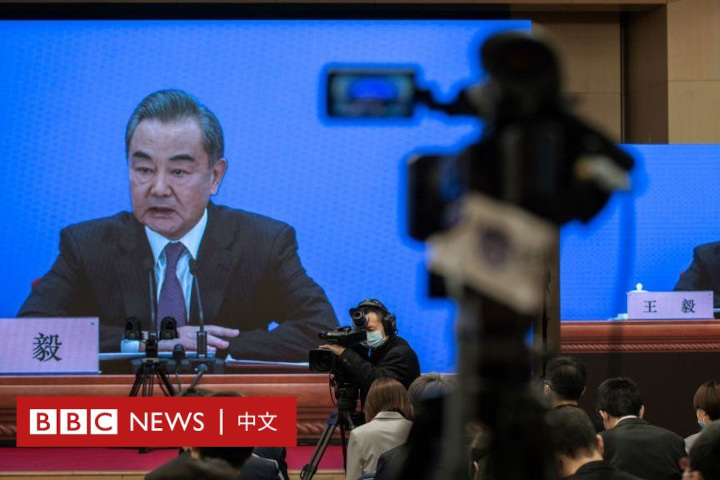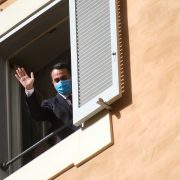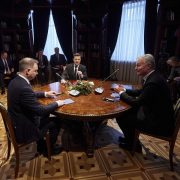
China is experiencing three different forces that are shaking up its world. One is the war in Ukraine and the spin of the propaganda about it. The second is its ties with Europe, also strained because of the war. The third is the wild card of North Korea incensing the situation in East Asia.
China initially believed that Russia would win easily in Ukraine and therefore blamed the «special operation» by Moscow on America because of NATO’s expansion.
«The eastward enlargement of NATO, led by the United States, is the root of the Ukrainian crisis»,[1] wrote a People’s Daily’s article under the pseudonym Zhong Sheng, used by the party mouthpiece for commentary on key international issues.[2]
«NATO has become a tool for the United States to practice its hegemony», the commentary said. «The US-led NATO has for a long time created turbulence around Russia, including starting ‘color revolutions’».
However, now the war is clearly turning against Russia, Chinese people realize it, and therefore America may come under a different light.
Yes, the United States may have been tricky and evil, fooling naive Russian President Vladimir Putin into the Ukrainian bear trap. However, by doing it, the United States is also smart. In fact, America is winning and Russia is losing, so if China is going on spinning the story that Russia was right in attacking Ukraine, it also sells the idea that Russia was stupid for failing against America.
Then why should China go with stupid Russia and not back the United States, which is doing much better? This is a conundrum that Beijing so far is failing to address, probably because it fails to realize the hidden message it tells Chinese people.
EU versus China
The other issue is about Europe. For decades, China has been trying to play Europe as a counterbalance to the United States and perhaps pit European issues against those of America. This policy may have scored a few successes as both Americans and Europeans were eager to run alone and against one another for the Chinese market.
However, the Ukrainian war has created a deep weakness in Europe. The European countries didn’t believe Putin would actually invade Ukraine as the United States had been saying for months. Once Putin invaded Ukraine, it was as if the whole architecture of the European mindset fell apart.
They had strategically misunderstood Russia for many years, they realized. The backbone of European politics was German Chancellor Angela Merkel’s idea that Russia could be convinced to turn to the West and forfeit its old ways in return for some essential honey: profitable trade with the EU. An embodiment of this idea was the pipelines bringing gas from Russia to Europe, mainly to Germany and Italy.
The thinking in Brussels was that Moscow’s interest at stake was too big to risk: gas was important for Europe but euros were even more critical for the Russian economy. Therefore, nobody would step on that essential bond.
War in Ukraine proved to Europe that Moscow could risk the euro supply in return for purely political and strategic gains. It was clear that if Russia had successfully incorporated Ukraine, two other areas would be at risk. Transnistria, which borders Romania, and the corridor cutting Poland from Lithuania and linking Belarus to the Russian enclave in Kaliningrad. That is, all the gains of peace and security made by Europe by the end of the Cold War could be put in jeopardy.
Germany had been the biggest winner of the Cold War. It had managed to reunite the country and put two layers of security between itself and Russia: a layer of NATO new members (Baltic states, Poland, Romania, Slovakia, et cetera) plus a layer of neutral countries (Belarus and Ukraine). All of this could end soon, Russia would again be at the German border, and thirty years of peace would be for nothing.
Moreover, in the course of contacts between delegates from old and new Europe—say Germany, Poland, or Romania—the Chinese seemed to their EU counterparts somehow callous about developments in Ukraine. For many European countries, events in Ukraine have a strong personal and psychological value. It brings back bitter memories of war and Soviet oppression that are still fresh in Europe. China had sounded particularly cavalier about these sentiments and oblivious to European security concerns, attributing all EU worries to the puppeteering of the United States behind the scenes.
A recent essay said:
«China-EU relations have reached an unprecedented stalemate. Reactions to the war in Ukraine and perceptions about the ensuing political crisis differ widely. The ongoing war in Ukraine can turn the already troubled China-EU relationship into an inoperable one. While Europe and China are at a crossroads, it is a crucial exercise to find ways out of this quagmire. It starts with recalling the key grievances on both sides».[3]
This had nasty consequences on April 1, when Chinese President Xi Jinping had a virtual summit with European leaders. The meeting was apparently frosty. The president of the EU commission Ursula von der Leyen was tough with Xi linking trade with EU with Chinese pressures on Russia. She then dismissed the Chinese approach: «let’s think of the economy creating greater difficulties in EU-Chinese relations».
Europe is China’s main market and, with the United States, it makes up the largest part of China’s exports. Beijing in recent years has been trying to wean off this dependency or transform it.
However, it is still there. Europe and especially Germany have very significant investments in China, but this in the future could be uncertain if Europe feels that China is in fact politically backing Russia in its Ukrainian adventure.
This feeling is reinforced by the official Chinese report of the meeting between Chinese and Russian foreign ministers, Wang Yi and Sergei Lavrov. The People’s Daily wrote:
«Lavrov briefed on the Russian-Ukrainian negotiations, saying that Russia is committed to cooling tensions and will continue peace talks with Ukraine and maintain communication with the international community. Wang Yi said that the Ukrainian issue has a complex history and context, which is both the outbreak of long-term accumulation of security contradictions in Europe and the result of Cold War thinking and group confrontation». [4]
But this is very different from how the EU, US, and the developed world see things. It is not about the right of a big state to have a sphere of influence; it is about being against solving political frictions through war and invasion, redrawing the end of the Cold War in Europe. For China, there appears to be little or no difference between the invasion of Iraq and the invasion of Ukraine.
The EU disagrees deeply with that viewpoint; although it didn’t approve of war in Iraq, it believes Ukraine is a whole different kettle of fish. The war in Iraq was to have a more orderly and peaceful Middle East; Ukraine was about spreading Russian naked power. There is power in both instances, but one dons values and principles, the other is naked. Here, in Europe, there is an immense gap.
This trumps economic returns, that, as the Russia case proved, will not guarantee a peaceful and stable environment.
In sum, in Europe and its heart, Germany, geopolitics plus morals trump economics. Chinese seem to miss this, failing to address the morals of the Ukrainian situation.
Here lurks a deeper divide: We have an order based on country power or on rules power. Of course, there’s overlap, but there is also a difference. Here ancient Chinese history could help, as the issue was somehow present.
In ancient China, Confucians advocated an «international and domestic order» based on the rules of the Rites of Zhou 周礼[5] or, according to Mohists, based on the Will of Heaven tianzhi 天志. Or could it be based on the power of one state guo 国 claiming the title of wang 王, righteous ruler? It was arguably clear to both Confucians and Mohists that if every state claimed to be wang they would fight with one another to annihilate the «wrong wang». Whereas, recourse to principles and common good would decrease friction. Therefore, if China buys into Russian rhetoric of NATO expansion, whereas Europe believes in general principles of peace and security, the gap with the EU could widen.
Ancient China is not the same as in modern times, but the analogy should help the Chinese understand their predicament.
Missiles from Pyongyang
The third threat comes from North Korea. Almost trying to steal the lousy limelight away from the Ukrainian fire, North Korea has been extremely busy launching missiles up in the air and posing as a new regional threat.
The latest attempt came on March 24 with the launch of a ballistic missile that could reach the whole of the United States, the Hwasong-17. It was the 12th launch since the beginning of the year. Moreover,
«North Korea’s nuclear programs also appear to be very active. On March 7, the director-general of the International Atomic Energy Agency reported ‘ongoing indications consistent with the operation of the 5-megawatt reactor at the Yongbyon site.’ The IAEA also said it continued to observe construction activities at the Yongbyon site, including constructing an annex to the reported Centrifuge Enrichment Facility, while commercial satellite imagery analysis indicated that there was renewed activity at the Punggye-ri nuclear test site, the first time since its closure in 2018».[6]
On April 15, the 110th birthday of eternal leader Kim Il-sung, grandfather of the actual leader Kim Jong-un, North Korea could test some more missiles. With Russia embroiled in Ukraine, China is the only viable lifeline to North Korea. Therefore it becomes easy for neighbors to blame China for abetting Pyongyang’s misbehavior.
Things have changed in South Korea, too. The new president elected in March, Yoon Suk-yeol, is firmer in his policies toward the North. Therefore the two elements are bringing about a firmer stance on North Korea: a more belligerent Pyongyang and a more resolute Seoul. This is welding back together the Northern security triangle of South Korea, Japan, and the United States.
Then, the United States is saying to China that either it manages to bring North Korea back to the table to discuss a true and effective disarmament or a new campaign of stronger containment against Pyongyang will have to be put in place.
Ambassador Joseph DeTrani, the architect of the six-party talks, wrote:
«It is time for China to again intercede with North Korea and, using its leverage, get the North to accept the unconditional invitation from the United States to meet anytime, anywhere. Once at the table, the United States and North Korea can resume a 27-year dialogue, with some hope that North Korea will realize that a path to normal relations with the United States in return for complete and verifiable denuclearization and appreciable progress on human rights issues in the North, is in Mr. Kim’s interest… If North Korea refuses to reengage, then the only principled option, working with our allies in South Korea and Japan, is to intensify a policy of containment and deterrence, with additional sanctions imposed on North Korea when they continue to violate U.N. resolutions prohibiting ballistic missile launches and nuclear tests».[7]
This could mean that new missiles or even nuclear weapons could be redeployed in South Korea. Here, there could be a thinly veiled warning to Beijing. New weapons deployed in South Korea or Japan are officially aimed at Pyongyang, but unofficially could also be used against Beijing, which puts China in a difficult position.
New Russian temptation
These three elements are all external, and China is suffering internally as well. New waves of Covid are paralyzing big cities, creating panic and discontent. This can be made up for by telling people that life is also harsh in the rest of the world.
However, the news is trickling into China that life is back to normal in Western countries with more effective vaccines. Furthermore, there is the real estate crisis, with large developers practically going bust. The sector was, for two decades, the main driver of economic growth. The state is buffering it by buying back properties from bankrupt private developers. This saves individual families but creates an even bigger burden for the state, already weighed down by the massive debt built up by financing the only residual big driver of growth, infrastructure expansion.
All in all, this creates multiple pressures on China that it can try to patch with clever stratagems, propaganda, and crafty diplomacy, but the more this goes on, the more it proves the whole architecture is failing.
In this, Beijing may be tempted to follow Russia once again. Moscow is allegedly finding a path for a truce in the war and withdrawal from Ukraine. However, Putin has opened two more issues that might keep tensions high in Europe. He demanded to be paid in rubles for its gas and, on March 30, flew jets that violated Swedish airspace «equipped with nuclear devices». He could keep Russians on a high alert with this brinkmanship, try to sell a new narrative of Russia under siege by NATO, and thus stay in power, fending off possible domestic backlash.
But tying China’s destiny to Russia even more could pull Beijing down if Putin were to fall. Still, removing itself from this situation may hasten Putin’s political demise and open China’s northwestern front. Neither is a good choice for Beijing.
The West’s tide is too big to turn, and the West is economically and militarily vast, especially if one welds together the US, EU, Japan, Korea, and other countries. Then China should understand that it needs to change to survive.
Beijing may need a big plan to get out of this mess.
[1] http://world.people.com.cn/n1/2022/0329/c1002-32386323.html
[2] https://www.scmp.com/news/china/diplomacy/article/3172228/china-hammers-home-its-message-us-blame-ukraine-war-domestic
[3] https://thediplomat.com/2022/03/europe-and-china-at-a-crossroads/
[4] http://paper.people.com.cn/rmrb/html/2022-03/31/nw.D110000renmrb_20220331_5-03.htm
[5] See 周礼 – 墨子
[6] https://www.washingtontimes.com/news/2022/mar/28/tension-korean-peninsula/
[7] See https://www.washingtontimes.com/news/2022/mar/28/tension-korean-peninsula/






Sisci is working on a libretto for a tragic Italian opera, based on half truth, speculation and guesswork.
Ukraine is the master plan of US CIA to emasculate Russia before turning towards its ultimate goal: China. Biden and Blinken already declared to the world that China is the real enemy because of the increasing strength of its economy technology diplomacy and military, posing a real challenge to US hegemony and supremacy. It is not Russia that lacks the economic power. But the developing world must ensure that Russia survives to provide a counter balance to US aggression. When the dust settles, we expect the petrodollar, that holds the world to ransom, to start its decline. More countries will be trading oil in their own currencies. The SWIFT system eventually reveals its true colour: a US political weapon that can be denied to countries US disapproves of.
You’re a simpleton thinker. China knows very well if Russia falls, China will be the next target. China is enjoying every moment of what is Russia doing…..unwinding the petrodollar, the west hegemony, breaking the SWIFT monopoly and re-balancing the world power.
The longer the Ukraine crisis drag on, Europe union will disintegrate into as every country will need to look after its interest.
Russia can sell all its gas to China and that will not meet China’s demand. Don’t underestimate the China, Russia relationship as they are inseparable in the context of each other existence.
If Nato had gone into Ukraine, I can bet China will not sit idle and watch. Too bad, Nato has no marbles to stand up against Russia.
This one sided analysis is typical of myopic Westersn worldview of late. The author seems to have been dreaming or drinking whilst coming up with this motley analysis. Suddenly West becomes vast and China is dependent on them as if EU is not dependent on China at all. Hell, even the EU’s godfather Uncle Sam is intertwined with China and very much dependent on it. The divorce will be messy and detrimental to both sides.
“But this is very different from how the EU, US, and the developed world see things. It is not about the right of a big state to have a sphere of influence; it is about being against solving political frictions through war and invasion, redrawing the end of the Cold War in Europe. For China, there appears to be little or no difference between the invasion of Iraq and the invasion of Ukraine.”
There is for the writer but one sphere of influence, that of US, and that encompasses the whole world?
Russia needs to keep as much eutral terrain between itself and NATO. Therefore it is not conquering Ukraine . It doesn’t conduct its war with Ukraine in the way US wages war, think of Iraq. Ukraine will remain a neighbor and slaughter on the scale US practises is merely criminal. The main purpose of the Russian operation
is the destruction of the Ukrainian army concentration to the west of Donbas. The purpose of the first phase of the operation was to isolate that grouping and to destroy relevant airfields and supplies to that grouping, mostly arms and munitions but also fuel reserves. It seems Ukraine is already destroying its bridges.
Russia encouraged people to escape from threatened or encircled cities to reduce casualties were it to become necessary to attack them. Half of its inhabitants did leave Kiev.
We are awaitng the outcome of the war but the way Western authorities misunderstand developments will encourage Russia.
For China there is a vast difference between the Iraqi and Ukrainian wars. The conquet of Iraq was intended to assure US superiority in the Middle East for the next half century. The Ukrainian war is seen as a way to defeat the effort of US to strenghthen its position in Europe against Russia, but also its power over Germany.
China is well aware that it needs Russia to be strong to deter US aggression against itself. Now that China’s economy is larger than that of US in PPP and the dollar is losing its position as a safe haven of wealth – the sanctions against Russia and its oligarchs – we see India avoiding dollars when buying oil from Russia and Saudi Arabia preparing to accept RMB for its oil – US has only its military power to oppose China. And having spent the last quarter of a century preparing for and fighting colonial type wars in Asia and Africa it has little hope for taking on China and Russia.
China has economic problems but those of US are worse. It needs to keep its economy from crashing by creating vast amounts of dollars out of thin air but has to accept a high rate of inflation which means that its citizens are being impoverished. It also means that foreign investors are robbed too. And the sanctions against some foreign investors will convince many to invest in other countries, even Russia – think of UAE and Saudi Arabia. In the circumstances we might expect European countries to restore relations with Russia. Think also of MH17, the Malaysian airliner that was shot down by the army op the newly installed coup regime in Ukraine in July 2014.
Sisci has no clue what he’s talking about when he tries to explain Chinese thought/philosophy.
Mohists thought the world was at war essentially because there was no unifying standards, and that people would argue about their different standards.
Confucians often thought, although not the only reason for war was that there was simply a lack of respect between EQUAL sovereigns, and that e.g. punitive measures were being taken out against what would be considered an EQUAL in status sovereign. Basic ideas of ritual and propriety would fix this issue. Moreover they held alliances in suspect and the way of the hegemon, and thought that ideas such as the horizontal and vertical alliances during the Warring States period only led to more war.